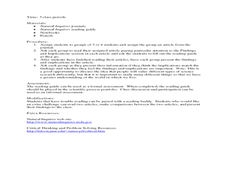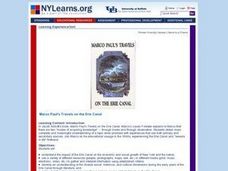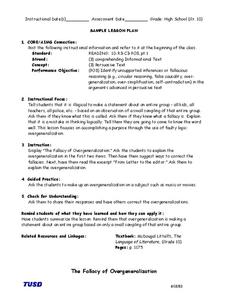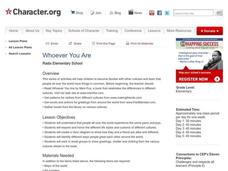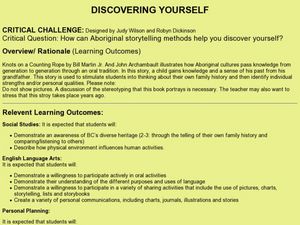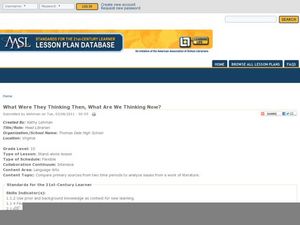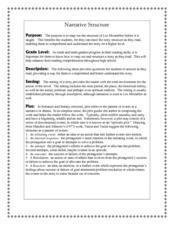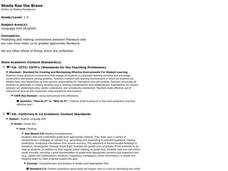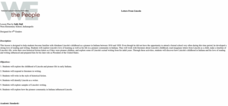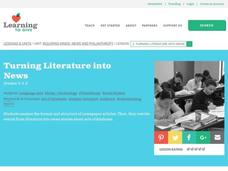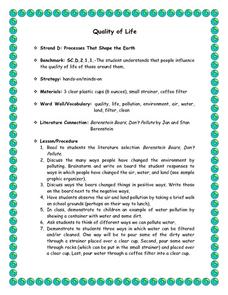Curated OER
Dramatizing Your Story
Students write a script, planning and recording improvisations based on personal experience and heritage, imagination, literature and history.
Curated OER
Discussing the Findings and Implications
Learners read a Natural Inquirer article and present the findings and implications to the class. They discuss if the findings match the implications and whether they think they are important.
Curated OER
Genres, Genres Everywhere
Young readers assume the role of Genre Sleuths to investigate the characteristics of folktales, fantasies, and mysteries. For this session you will need to collect a variety of books on a topic you have been studying. Groups then examine...
Curated OER
HEROs Project
What does it take to be a hero? In small groups, middle schoolers design a hero by identifying heroic characteristics and recording responses on an online blog. Use this lesson as an extension in a literature unit about a heroic...
Curated OER
Marco Paul's Travels on the Erie Canal
Students conduct research in order to create an understanding of The Eerie Canal and its place in history and the world. students use a variety of primary and secondary resources to aid in the research process.
Curated OER
If I Were the Wind
Eighth graders are introduced to authors in the conservation community. As a class, they describe a personal experience they have had with nature. They identify examples of an author's descriptive writing techniques and answer questions...
Curated OER
Comprehending Informational Text
Do you know what a fallacy is? Discuss this term and its meaning with your class. Then, talk about why making generalizations about a large group of people isn't the best thing to do. As a group, study the included letter excerpt. It...
Curated OER
Officer Buckle and Gloria
Students write a class letter to a local policeman asking him to come and talk to the class and create a list of safety tips as a class. Students research information on police dogs: type of dogs used, where they come form, how they are...
Curated OER
Whoever You Are
Students examine cultures, traditions, and feeling throughout cultures. In this cultural lesson, students use literature, maps, and cultural information to examine how people have universal feelings despite their different cultures and...
Curated OER
Discovering Yourself
Students explore Aboriginal storytelling. In this literature lesson, students read Knots on a Counting Rope and then create a story line as they discuss the attributes of Aboriginal culture. Students retell the story in their own words.
Curated OER
What Were They Thinking Then, What Are We Thinking Now?
Choosing an issue from a play or novel, researchers find two primary sources from different time periods to compare how people's views have changed. Many questions are listed to guide young writers. In the end, learners produce a...
Curated OER
Dr. Heidegger's Experiment
Examine the idea of perpetual youth and immortality while you read Nathaniel Hawthorne's Dr. Heidegger's Experiment. Some links work to direct your learners to information about the Fountain of Youth. Using this information, scholars...
Curated OER
Narrative Structure: Les Miserables
What is the initiating event? What is the protagonist's goal? What attempts are made to achieve this goal? What is the outcome? Model for your class how to map out the structure of any narrative. Readers then search for answers as the...
Curated OER
Snowy Evening Poetry for ESL (Elementary, Literature)
Learners read Robert Frost's Stopping by the Woods on a Snowy Evening, illustrated by Susan Jeffers (2001). This is a wonderful book with beautiful illustrations that go with each line of the poem.
Curated OER
Sheila Rae, the Brave
Students read Sheila Rae, the Brave, and make predictions about the main character.
Curated OER
What Are the Literary, Artistic, Scientific, and Technological Contributions of Immigrants to the United States?
Students evaluate impact of immigration on America's economy and culture, research information about people of various countries of origin, and share findings with classmates through collages, posters, handouts, or skits.
Curated OER
Story Elements
Young scholars create a "character T-shirt" that exemplifies their ability to analyze a character. The students also compare and contrast characters in a given story. Finally, the young scholars write a presentation about the story's...
Curated OER
Bath Time
Students strengthen reading comprehension skills with the guided reading of Bath Time. They practice literacy skills like reading a patterned sentence with the help of the teacher for scaffolding. Students also recognize the sequencing...
Curated OER
The Witch of Goingsnake
Students listen to The Ballad of Ira Hayes and write paragraphs about his character. In this The Witch of Goingsnake lesson, students read the verses and chorus of the ballad aloud and make notes about Ira Hayes. Students write a...
Curated OER
Letters from Lincoln
Fourth graders explore the childhood of Lincoln and pioneer life in early Indiana. Students respond to literature and write a story using historical fiction. Students explore the writings of President Lincoln and the pioneer community...
Curated OER
Inquiring Minds: News and Philanthropy
Students study newspaper articles and rewrite events from literature into news stories about kindness. In this news article lesson, students read sentences from newspaper articles and identify the purpose of the article. Students...
Curated OER
When My Name Was Keoko
Students construct a book banquet to help us to recall and enjoy food eaten in Korea during the 1940's. The class is to read When My Name Was Keoko and then create a book banquet that the students invite their parents to. Students cook...
Curated OER
Quality of Life
Students discover that people influence the quality of life of those around them. They read the literature selection 'Berenstein Bears, Don't Pollute' and discuss the many ways people have changed the environment by polluting.
Curated OER
Our Five Senses
Students use their five senses to describe what's in a mystery bag. In this senses lesson, students use a graphic organizer to collect words for a sensory poem.



